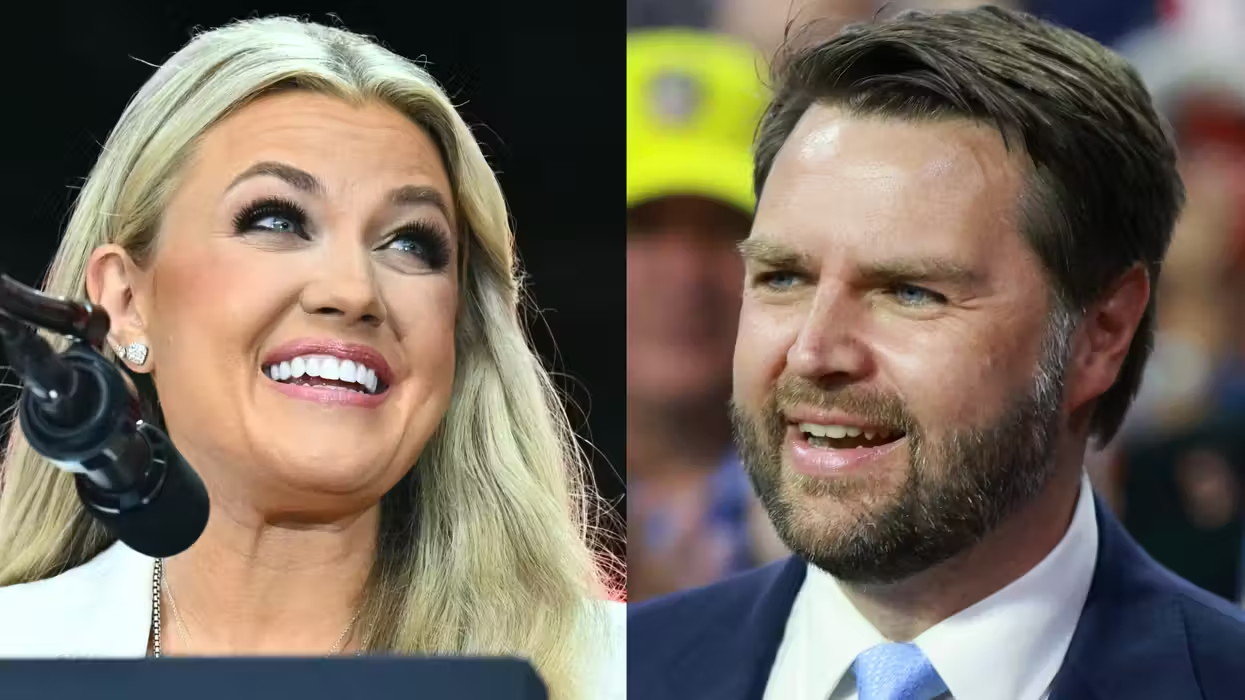
© 2025 Blaze Media LLC. All rights reserved.
When courts redefined life, marriage, and human sexuality, it was only a matter of time before they redefined our national borders. Today, as we watch the other branches of government outsource national sovereignty to the Fourth Circuit Court of Appeals, we will experience the ultimate government shutdown that we never experienced through a budget impasse.
In his foreword to my book, “Stolen Sovereignty,” Conservative Review Editor-in-Chief Mark Levin wrote that “of all the possible challenges to the constitutional system our founders lost sleep over, a judicial oligarchy wasn’t one of them.”
“Sure, they feared each branch of government would attempt to usurp the power of the people,” wrote Levin, who first warned of the magnitude of this crisis in “Men in Black,” “but they never believed they would be replacing King George with a tyranny of unelected judges in black robes.”
Imagine the look on James Madison’s face were he to watch the spectacle of the attorney general groveling before a lower court, which is itself an institution created by Congress, asking for permission to follow immigration law and protect national sovereignty? Worse, imagine the founders’ reactions were they to see a vision of the other two branches sitting idle and obsequiously complying with a lower court judge granting 7.5 billion people a potential affirmative right to immigrate based on the Bill of Rights? And still worse, what would they say when the president and Congress fail to pass a budget bill responding to those insane courts by blocking funding for the visas demanded by the royal robes?
Yet that is where we find ourselves today, as the Trump administration grovels before the Fourth Circuit Court of Appeals to overturn a nationwide injunction enacted by a district judge against national sovereignty. On March 16, U.S. District Judge Theodore Chuang of Maryland gave standing to a group of taxpayer-funded refugee resettlement contractors and relatives of foreign nationals to sue against Trump’s executive action on immigration. Not only did this judge create an affirmative right for foreign nationals with visas to enter the country, he took it a step further and enjoined even the second Trump order, which only affected hypothetical prospective immigrants/travelers from six countries who haven’t even applied yet! In addition, the judge essentially nullified the Refugee Act of 1980 by stripping the president of the power to set the refugee cap.
Judges in Hawaii and Wisconsin issued similar orders.
The entire premise of this case is among the most absurd lawsuits ever brought in court for a number of reasons:
- For decades upon decades, the courts have been clear that the right to exclude is plenary and entirely the political branches’ prerogative. The courts have no power to second-guess any decision — and that is settled law.
- Seven statutes grant the president full power to bar entry to aliens, even those who have already received visas. In fact, one of the laws, 8 U.S. Code §1201(h)(i), which passed the Senate 96-2 in 2004, explicitly stripped the courts of any jurisdiction to adjudicate the revocation of visas for anyone seeking entry into the country.
- A foreign national has no legitimate standing to challenge federal immigration laws or national sovereignty.
- Shockingly, the other plaintiffs in this lawsuit are refugee resettlement contractors who were given standing to sue on the grounds that they are entitled to taxpayer funding and that a refugee moratorium would hurt their business!Even if foreign nationals could get standing through U.S. relatives, this case was not ripe because it assailed the president’s policies on “future” immigration. Thus there was no valid case or controversy with injury-in-fact.
- The notion that a district judge could issue a nationwide injunction outside the specific case to apply to a national immigration policy is bonkers.
- The district judge used political statements as the foundation of his legal argument, which should scare anyone who wants to uphold jurisprudential standards.
- The entire premise that the Establishment Clause grants foreign nationals a religious liberty right to immigrate (but not conscience and property rights to Americans of faith!) is preposterous. Nor is there any Equal Protection or Due Process right. As the Supreme Court said in Ju Toy v. United States (1905):
“That Congress may exclude aliens of a particular race from the United States, prescribe the terms and conditions upon which certain classes of aliens may come to this country, establish regulations for sending out of the country such aliens as come here in violation of law, and commit the enforcement of such provisions, conditions, and regulations exclusively to executive officers, without judicial intervention are principles firmly established by the decisions of this Court.” [emphasis added]
Two years prior, in “The Japanese Immigrant Case,” the court used the exact same language and declared that, based on an uninterrupted stream of near-unanimous decisions, the constitutionality of such an exclusion “is no longer open to discussion in this Court.”
- Even if we agreed to this absurd and dangerous premise that there are anti-discrimination limitations on national sovereignty, a premise these courts have apparently accepted as gospel, there is no discrimination here. The moratorium on refugees are applied equally to every nation, and the six countries targeted for suspension of visas are enemy or failed states. The largest Muslim nations are not even on the list.
- Seven statutes grant the president full power to bar entry to aliens, even those who have already received visas. In fact, one of the laws, 8 U.S. Code §1201(h)(i), which passed the Senate 96-2 in 2004, explicitly stripped the courts of any jurisdiction to adjudicate the revocation of visas for anyone seeking entry into the country.
- In addition to being covered and even mandated by statute, the right to exclude is inherent in the president’s Article II powers. Here is the money quote from Knauff v. Shaughnessy, 1950).
“When Congress prescribes a procedure concerning the admissibility of aliens, it is not dealing alone with a legislative power. It is implementing an inherent executive power.
“Thus, the decision to admit or to exclude an alien may be lawfully placed with the President, who may, in turn, delegate the carrying out of this function to a responsible executive officer of the sovereign, such as the Attorney General. The action of the executive officer under such authority is final and conclusive. Whatever the rule may be concerning deportation of persons who have gained entry into the United States, it is not within the province of any court, unless expressly authorized by law, to review the determination of the political branch of the Government to exclude a given alien.”
Sadly, so much of this won’t even be entertained in the case before the Fourth Circuit. Nobody has any doubt how the court will rule because it is completely overrun by leftists. But even if the Supreme Court ultimately overturns the lower courts, it will still be on relatively narrow grounds. Our sovereignty is already lost forever. Much like the legal ratchet I warn about in my book, the legal Left will just pick up where they left off next time – already claiming most of national sovereignty for the courts – and expand upon it one case at a time.
What will it take for the other branches to finally make themselves relevant again?
Read more
- The appalling hypocrisy, ignorance of courts on immigration and states' rights
- The full case for why courts have no jurisdiction over Trump's immigration order
- Impeach Judge James Robart for violating sovereignty and Constitution
- How to tell the difference between Trump and Obama's refugee EOs? Trump actually follows the law
- Rogue judges undermine our sovereignty. Here's how Congress can stop them.
- These 16 quotes prove America can exclude or deport any immigrant … for any reason
- These 73 sitting Democrats voted to ban visas from some Muslim countries. That law still exists.
- Just how radical was the Ninth Circuit’s nullification of law?
- 7 statutes that CLEARLY support Trump’s immigration executive order
Editor's note: This article has been updated to reflect a typographical error.
Want to leave a tip?
We answer to you. Help keep our content free of advertisers and big tech censorship by leaving a tip today.
Want to join the conversation?
Already a subscriber?
Blaze Podcast Host
Daniel Horowitz is the host of “Conservative Review with Daniel Horowitz” and a senior editor for Blaze News.
RMConservative
Daniel Horowitz
Blaze Podcast Host
Daniel Horowitz is the host of “Conservative Review with Daniel Horowitz” and a senior editor for Blaze News.
@RMConservative →more stories
Sign up for the Blaze newsletter
By signing up, you agree to our Privacy Policy and Terms of Use, and agree to receive content that may sometimes include advertisements. You may opt out at any time.
Related Content
© 2025 Blaze Media LLC. All rights reserved.
Get the stories that matter most delivered directly to your inbox.
By signing up, you agree to our Privacy Policy and Terms of Use, and agree to receive content that may sometimes include advertisements. You may opt out at any time.






